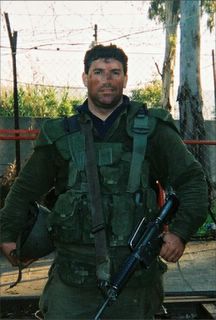The New Zionist is an online news and discussion forum that deals with the future of Zionism, Israel, and the Jewish People. The editors were kind enough to invite me to answer a number of questions relating to my military service, current events in the region, and to provide predictions relation to the future of Israel as well as the Jewish-American community.
Read the interview in full by visiting: www.newzionist.com
Here is a sample of the Q&A:
NZ: You state that you wonder if Israeli restraint only encourages more violence
AH: As someone who identified with the center-left throughout the 80’s and 90’s, I can’t help but wish that recent history had not provided ample data points to suggest that Israeli policies of restraint were based on an overly-optimistic assessment of the Palestinian, Lebanese, and Syrian leadership. Especially throughout the 90’s – during the Oslo Peace Process and negotiations with Syria – Palestinian terror and Hezbollah activity increased at an alarming rate. At the time, I believed that we were experiencing the last gasp of reactionaries who would eventually be sidelined by moderates who wanted a true rapprochement with Israel.
Also, I didn’t worry about Hezbollah victory speeches when Israel withdrew from Lebanon in 2000. Arab leaders are masters at self-congratulation in the aftermath of their defeats. But the continuing militancy of Hezbollah after Israel’s withdrawal and Arafat’s decision to spark a second Intifadah made it clear that my more cynical friends – who believed that we should be paying closer attention to what Arab leaders were saying in Arabic and not English – were right. The terrorists were not just using incitement and murder to gain more power within their own societies, they were – and still are – the vanguard of a culture that refuses to acknowledge Israel’s right to exist and believes that Western values make us weak. As a result, they have interpreted our outstretched hands as a sign that the Israeli people in particular – and the West in general – does not have the will or ability to defeat them.
NZ: One of the most interesting aspects of the book is how different the IDF is as compared to the American Military. Whether it is true or not, the American Military has an image of blind faith in your superior, abusive sergeants, and massive air assaults. More recently, the image of the American Army is of a group of soldiers racing through the streets of Baghdad in broad daylight on the back of a Humvee with a documentary film crew riding along. What do you think are the main differences between the Israeli and the American Army?
AH: First and foremost, national service is compulsory in Israel. While most highly motivated American high school students are trying to gain entrance into Ivy League schools, their Israeli counterparts are testing to join elite infantry, air force, and intelligence units. As a result, Israeli military units select from a much larger pool of qualified candidates than the American military. This enables Israel to constantly increase standards for acceptance at a time when the American military is lowering the bar.
Of course, as people who have served in the military can attest, being one of the “best and the brightest” doesn’t necessary mean that you’re going to be a fantastic soldier. And more importantly, it’s valuable to note that soldiers who lacked many advantages growing up or who weren’t stellar scholars during school may well demonstrate an aptitude in the field that is far superior to their well-heeled peers. As I mention in my book, I have served with some smart people who were dumb soldiers and others who barely completed high school who I would completely trust with my life once we were in the field.
But the combination of mandatory service and the high concentration of over-achievers in the Israeli military has created a culture that is more adaptive than the US military. By adaptive, I refer to the fact that the Israeli military highly encourages change in a way that is very different from the US military. In the Israeli military, new recruits are taught to ask questions and provide constructive criticism. This forces commanders to lead by example and by gaining consensus from his team, as opposed to leading through fiat, as is done in the US military. This keeps commanders on their toes and creates a conduit for new ideas and innovations that make the military more effective over time, while creating the short-term benefit of avoiding missteps that may occur when decisions are made by a single individual.
Another interesting difference is that the Israeli military training methodology features a level of on-the-job training that is rather unique. Israeli soldiers, at the beginning stages of their training, are tasked with relatively low-intensity missions – manning a checkpoint on a secondary road, conducting an ambush in a place where there is a low probability of engaging the enemy, patrolling relatively quiet streets, etc. The consequence is that the proficiency of soldiers and commanders are tested in an evolutionary way that enables superiors to decide whether they are suitable for more complicated tasks, soldiers are able to better understand how their training relates to the real-world, and the gradual introduction to more complicated scenarios increases effectiveness while reducing associated stress. By contrast, American soldiers only experience real combat after completing their training in full.
Read the interview in full by visiting: www.newzionist.com


0 Comments:
Post a Comment
Subscribe to Post Comments [Atom]
<< Home